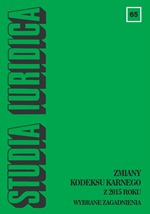Artykuł 28 § 1 k.k. po nowelizacji z dnia 20 lutego 2015 r. Uwagi na temat konieczności oddzielania strony podmiotowej czynu zabronionego od winy
ART. 28 § 1 OF THE CRIMINAL CODE AFTER THE AMENDMENTS OF FEBRUARY 20TH, 2015. COMMENTS ON THE NECESSITY OF SEPARATING MENS REA OF A PROHIBITED ACT FROM GUILT
Author(s): Zbigniew JędrzejewskiSubject(s): Law, Constitution, Jurisprudence, Criminal Law
Published by: Wydawnictwa Uniwersytetu Warszawskiego
Keywords: prohibited act; mens rea; intentional character of an offence; unintentional character of an offence; guilt; act committed while being in justifiable error as to a circumstance constituting a feature
Summary/Abstract: The object of analysis is the amended art. 28 § 1 of the Criminal Code, which stipulates that „whoever commits an act while being in justifiable error as to a circumstance constituting a feature of an prohibited act, shall not commit a crime”. The new regulation of 28 § 1 of the Criminal Code is the next attempt to statutorily define the concept of an offence based on the methodology of a strict separation of the object of evaluation from the evaluation itself, that is, primarily a radical separation of mens rea of a prohibited act from guilt. Therefore, the authors of the change have consistently attempted to eliminate all normative attributes from the scope of „recklessness” and „negligence”. This is a result of the view that assumes a pure descriptive character of the set of criminal offence features (Ger. „Tatbestand”) including subjective features (offences of intentional and unintentional character). In this context, acts committed while being in justifiable error as to a circumstance constituting a feature of a prohibited act exclude guilt, however the fulfilment of the features of criminal acts of unintentional character is limited to the fulfilment of objective features (a consequence of the concept of the unintentional character of an offence as a plain negation of intent). The negative wording of art. 1 § 3 of the Criminal Code, the objective and general interpretation of the term found in art. 9 § 2 „could have foreseen” (a transfer of the so-called objective foreseeability to the category of objective attribution) and the concept of committing an act while being in justifiable error as to a circumstance constituting a feature of a prohibited act excluding guilt lead, in the area of unintentional character of an offence, to the presumption of guilt on the basis of the fulfilling only the objective features of a criminal act. The author of the article demonstrates the inaccuracy of this argument for a strictly descriptive character of the features of a prohibited act, and in particular the features of intent (intentional character of an offence). The object of intent (a feature of a criminal offence) has a evaluative character (evaluation), therefore determining intent can generally constitute a premise for accepting guilt (intended), unless the circumstance of excluding guilt exceptionally occurs. In the case of an unintentional character of an act, such a relation does not occur, and the guarantee functions (the rule of positive establishment of the perpetrator’s guilt) thus require subjective (specific and individual evaluation) interpretation of the premise „could have foreseen” found in art. 9 § 2 of the Criminal Code.
Journal: Studia Iuridica
- Issue Year: 2016
- Issue No: 65
- Page Range: 25-40
- Page Count: 16
- Language: Polish

